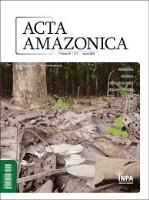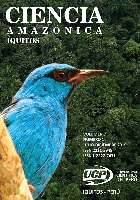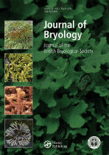
ACTA AMAZONICA
Scope & Guideline
Unveiling Biodiversity: Insights from the Amazon.
Introduction
Aims and Scopes
- Biodiversity Assessment and Conservation:
Research focused on documenting and assessing the biodiversity of flora and fauna in the Amazon, including new species descriptions, distribution records, and conservation strategies. - Ecological Interactions and Ecosystem Dynamics:
Studies investigating the ecological relationships among species, including predator-prey dynamics, resource utilization, and the effects of habitat alteration on species interactions. - Environmental Impact Studies:
Research evaluating the effects of human activities, such as deforestation, mining, and pollution, on Amazonian ecosystems and their biodiversity. - Ethnobiology and Indigenous Knowledge:
Exploration of traditional ecological knowledge held by indigenous communities, including the use of local resources and the cultural significance of biodiversity. - Agricultural and Aquacultural Practices:
Investigations into sustainable agricultural and aquacultural practices within the Amazon, focusing on the interaction between local economies and environmental sustainability. - Physiological and Biochemical Studies:
Research examining the physiological responses of Amazonian species to environmental stressors, including studies on medicinal plants and their potential applications.
Trending and Emerging
- Climate Change Impacts:
An increasing number of studies are addressing the impacts of climate change on Amazonian ecosystems, including alterations in species distribution, phenology, and ecosystem functioning. - Bioremediation and Environmental Restoration:
Research on the use of bioremediation techniques and restoration ecology has gained prominence, reflecting a broader interest in sustainable practices to mitigate environmental degradation. - Health and Medicinal Applications of Amazonian Biodiversity:
There is a notable trend towards investigating the health benefits and medicinal properties of Amazonian flora, emphasizing the intersection of biodiversity and human health. - Ecological Modeling and Predictive Studies:
Emerging studies are increasingly utilizing ecological modeling to predict outcomes of environmental changes, focusing on species responses and habitat dynamics. - Microbial Ecology and Endophyte Research:
A growing interest in microbial interactions, particularly endophytes and their roles in plant health and resilience, indicates an expanding focus on the microbial components of Amazonian ecosystems.
Declining or Waning
- Traditional Agricultural Practices:
Research on traditional agricultural methods appears to be waning, possibly due to a shift towards more modern or sustainable farming practices that integrate technology and ecological considerations. - Studies on Non-native Species:
There seems to be a decrease in publications addressing non-native species interactions, perhaps indicating a focus shift towards native biodiversity conservation and the impacts of invasive species. - Historical Ecology:
Research focusing on historical ecological conditions and changes in the Amazon has become less frequent, possibly due to a growing emphasis on contemporary ecological issues and immediate conservation needs.
Similar Journals

NORTHWEST SCIENCE
Advancing ecological understanding, one study at a time.NORTHWEST SCIENCE, published by the NORTHWEST SCIENTIFIC ASSOCIATION, serves as a vital resource for researchers and professionals in the fields of ecology, evolution, and systematics. With an ISSN of 0029-344X and an E-ISSN of 2161-9859, this journal has been disseminating valuable scientific insights since its inception in 1975 and continues to do so into 2024. Although currently positioned in the Q4 quartile for its category, it plays a crucial role in advancing the understanding of ecological and biological sciences, reflecting a diverse range of studies and methodologies. Researchers will find the journal particularly appealing due to its emphasis on regional studies and their implications on a global scale. While NORTHWEST SCIENCE is not an open-access publication, it provides significant contributions to the academic dialogue within its discipline, making it an essential addition to the library of any dedicated researcher, student, or professional in the environmental sciences.

Ciencia Amazonica
Connecting Cultures and Ecosystems: Your Gateway to Amazonian ResearchCiencia Amazonica is a prominent academic journal dedicated to the exploration and dissemination of research pertaining to the Amazon region, reflecting the rich biodiversity, cultural heritage, and environmental challenges that characterize this unique ecosystem. Published by UNIV CIENTIFICA PERU, this journal has embraced an Open Access model since 2011, ensuring that valuable scientific findings are freely accessible to researchers, professionals, and students worldwide. With its commitment to fostering collaborative research and dialogue, Ciencia Amazonica serves as an essential platform for sharing innovative studies, fostering conservation efforts, and promoting sustainable development practices within the Amazon Basin. As the journal continuously seeks to engage with critical issues faced by this vital region, it is a crucial resource for anyone interested in the complex interplay of ecology, social sciences, and environmental policy in the Amazon.

PACIFIC CONSERVATION BIOLOGY
Connecting researchers to safeguard our planet's ecological treasures.PACIFIC CONSERVATION BIOLOGY is an esteemed academic journal published by CSIRO PUBLISHING, dedicated to advancing research in the fields of ecology and nature conservation. With a strong focus on the unique challenges and biodiversity of the Pacific region, this journal serves as a crucial platform for researchers, conservationists, and students alike to disseminate high-quality, impactful findings. Operating from Australia, it has become a significant resource since its inception in 1993, navigating through nearly three decades of vital scholarly communication. Ranked in the Q2 category for both Ecology and Nature and Landscape Conservation as of 2023, PACIFIC CONSERVATION BIOLOGY maintains rigorous standards, as reflected in its successful Scopus rankings. The journal plays a pivotal role in addressing pressing ecological issues and fostering innovative conservation strategies, making it an essential reference for anyone involved in environmental science. Access options for the journal facilitate widespread distribution of knowledge, supporting the mission to promote informed decision-making in conservation practices.

JOURNAL OF BRYOLOGY
Advancing Knowledge in Bryophyte ResearchThe JOURNAL OF BRYOLOGY, published by TAYLOR & FRANCIS LTD, is an esteemed academic journal dedicated to the field of bryology, focusing specifically on the study of mosses and liverworts. With an impressive converged publication record from 1972 to 2024, the journal offers a platform for the dissemination of high-quality research that explores ecological, evolutionary, and systematic aspects of these vital plant groups. The journal is recognized within the Q2 quartile in both the Ecology, Evolution, Behavior and Systematics and Plant Science categories, demonstrating its significance in contributing to the scientific community's understanding of plant life. With its notable Scopus Rankings placing it in the top echelons of its field, the JOURNAL OF BRYOLOGY serves as an essential resource for researchers, professionals, and students alike, fostering a deeper appreciation of bryophyte biodiversity and their ecological roles. The journal does not currently offer an open access option, ensuring that subscribers have access to well-curated, rigorously peer-reviewed studies filled with critical insights into flora conservation and environmental sustainability.

Acta Brasiliensis
Empowering Research in Brazilian Studies for a Global AudienceActa Brasiliensis is an esteemed academic journal published by the Federal University of Campina Grande. With an ISSN of 2526-432X and an E-ISSN of 2526-4338, this open access journal has been fostering scholarly communication in the field of Brazilian studies since its inception in 2017. Acta Brasiliensis aims to disseminate high-quality research by providing a platform for scholars, professionals, and students to share their work related to various aspects of Brazilian culture, society, and development. The journal's commitment to open access ensures that its content is freely available, promoting wider accessibility and engagement within the academic community. With a growing reputation in the landscape of scientific research, Acta Brasiliensis is poised to make significant contributions to the understanding of Brazilian studies, thereby advancing discourse and collaboration among researchers worldwide.

Revista Cientifica da Faculdade de Educacao e Meio Ambiente
Advancing Knowledge in Education and Environmental StewardshipRevista Cientifica da Faculdade de Educacao e Meio Ambiente, with ISSN 2179-4200, is a peer-reviewed academic journal published by FAEMA-FAC EDUCACAO & MEIO AMBIENTE in Brazil. This journal is dedicated to fostering innovative research and scholarly discourse within the intersecting fields of education and environmental studies. Aimed at researchers, educators, and practitioners, it emphasizes the importance of sustainable educational practices and environmental awareness. Although currently not indexed with an impact factor, its commitment to quality and relevance in scientific communication positions it as a crucial platform for disseminating valuable insights and findings. The journal provides an open access format, ensuring that research is widely available to a global audience, promoting collaboration and knowledge sharing. As education and environmental challenges continue to evolve, this journal serves as an important resource for those seeking to contribute to these vital fields.

ACTA BIOLOGICA COLOMBIANA
Pioneering Open Access in Colombia's Scientific LandscapeACTA BIOLOGICA COLOMBIANA, published by UNIV NAC COLOMBIA, FAC CIENCIAS, DEPT BIOL, is a significant open-access journal dedicated to advancing research in the field of agricultural and biological sciences. Since its inception in 2005, this journal has provided a dynamic platform for scholars to share their findings, fostering scholarly communication and collaboration within the scientific community. With an ISSN of 0120-548X and an E-ISSN of 1900-1649, it maintains a visible presence in the academic landscape, evident in its Q3 ranking in the 2023 Agricultural and Biological Sciences category and a Scopus rank of 117 out of 221, placing it in the 47th percentile. The journal's commitment to inclusive access facilitates greater dissemination of knowledge, as it serves researchers, professionals, and students in Colombia and beyond. Spanning articles from 2008 to 2024, ACTA BIOLOGICA COLOMBIANA is poised to continue its vital role in shaping the future of biological research.

REVISTA CHILENA DE HISTORIA NATURAL
Exploring the Depths of Natural HistoryREVISTA CHILENA DE HISTORIA NATURAL, published by the SOCIETAD BIOLOGIA CHILE, is an esteemed open-access journal dedicated to the fields of Agricultural and Biological Sciences as well as Environmental Science. With an ISSN of 0716-078X and an E-ISSN of 0717-6317, the journal has maintained an impactful presence since its inception in 2000, offering unrestricted access to vital research that influences the biodiversity and ecological initiatives in the region and beyond. Positioned in the Q2 quartile for Agricultural and Biological Sciences and Q3 for Environmental Science as of 2023, REVISTA CHILENA DE HISTORIA NATURAL exemplifies its commitment to high-quality and influential research, evidenced by its respectable ranking in Scopus—89th percentile for Agricultural and Biological Sciences and 131st in Environmental Science. Operated out of Santiago, Chile, and covering a wide range of topics with a converging publication timeline from 2002 to 2024, this journal serves as a crucial resource for researchers, professionals, and students looking to deepen their understanding of natural history and its implications for future ecological preservation.

AMBIO
Illuminating pathways to a healthier planet through rigorous scholarship.AMBIO, published by Springer, is a prestigious journal that has been at the forefront of environmental research since its inception in 1973. With an ISSN of 0044-7447 and an E-ISSN of 1654-7209, this journal provides a vital platform for the dissemination of interdisciplinary studies that intersect ecology, environmental chemistry, geography, and medicine. Based in the Netherlands, AMBIO holds a remarkable position in the academic world, ranked Q1 in multiple categories, including Ecology and Environmental Chemistry, reflecting its commitment to high-quality scholarly work. Researchers looking to contribute to or stay abreast of significant advancements in understanding and addressing contemporary environmental challenges will find AMBIO to be an essential resource, catering to the needs of a diverse audience comprising scholars, practitioners, and policymakers. While the journal is not open access, its wide-ranging influence in the social sciences, particularly regarding geography and development, alongside its high impact factor, underscores its importance for the future of environmental research.

BMC Zoology, published by BMC, is a distinguished open-access journal that has been advancing the field of zoological research since its inception in 2016. With an impressive Q2 ranking in both Animal Science and Zoology categories as of 2023, the journal occupies a significant position in the academic landscape, engaging a global readership dedicated to the exploration of animal biology. Based in the United Kingdom, BMC Zoology prides itself on providing a platform for innovative research, fostering collaboration among scientists, and facilitating access to high-quality scholarly articles. Researchers and practitioners in zoology can benefit from its extensive repository of articles that span various areas including conservation, ecology, and evolutionary biology. As an essential resource for scholars and students alike, BMC Zoology commits to enhancing the dissemination of knowledge in the zoological sciences through its open-access model, ensuring widespread access to cutting-edge research findings.